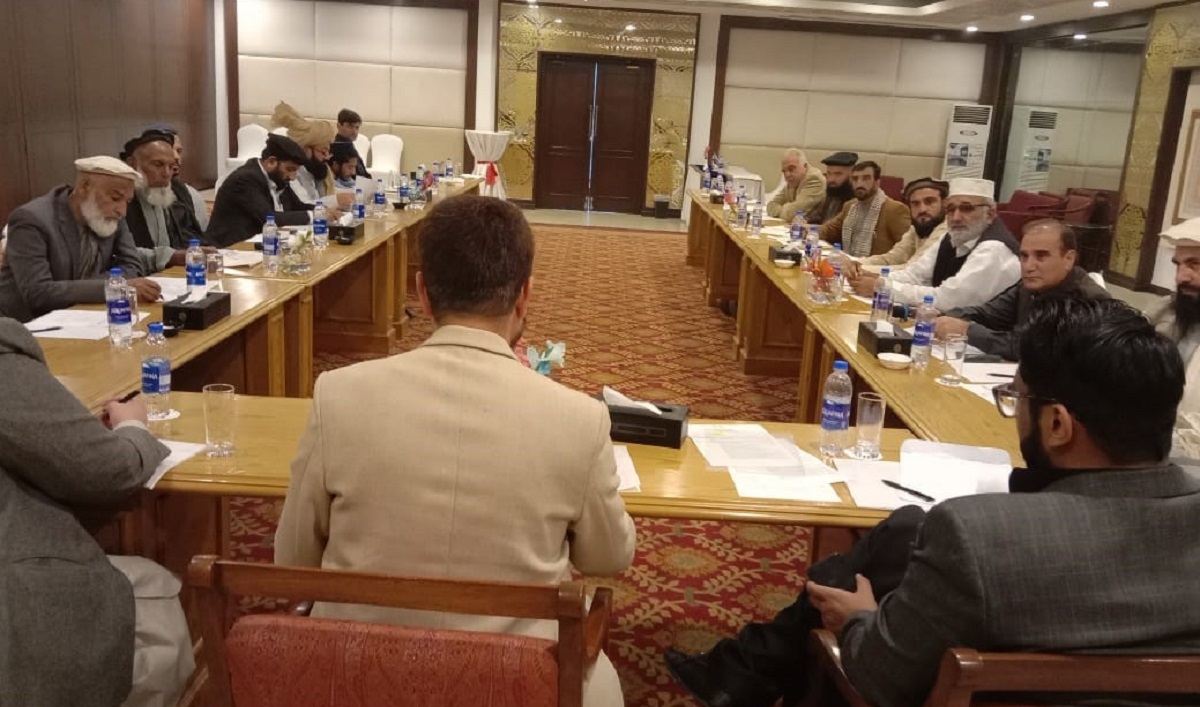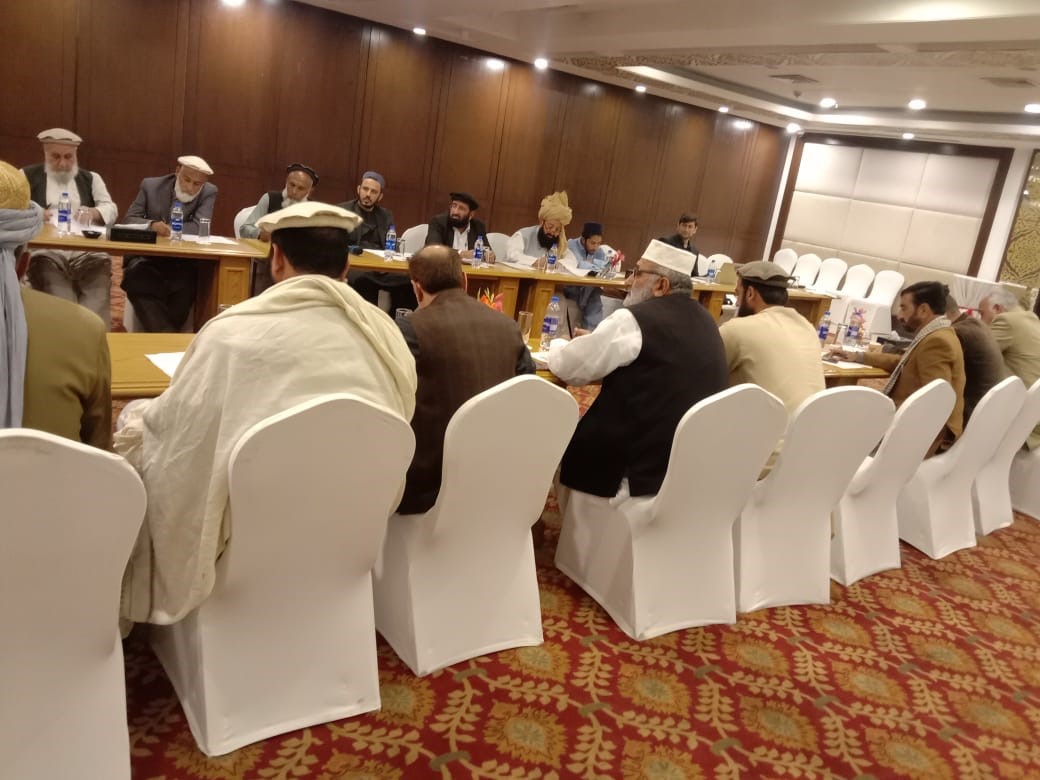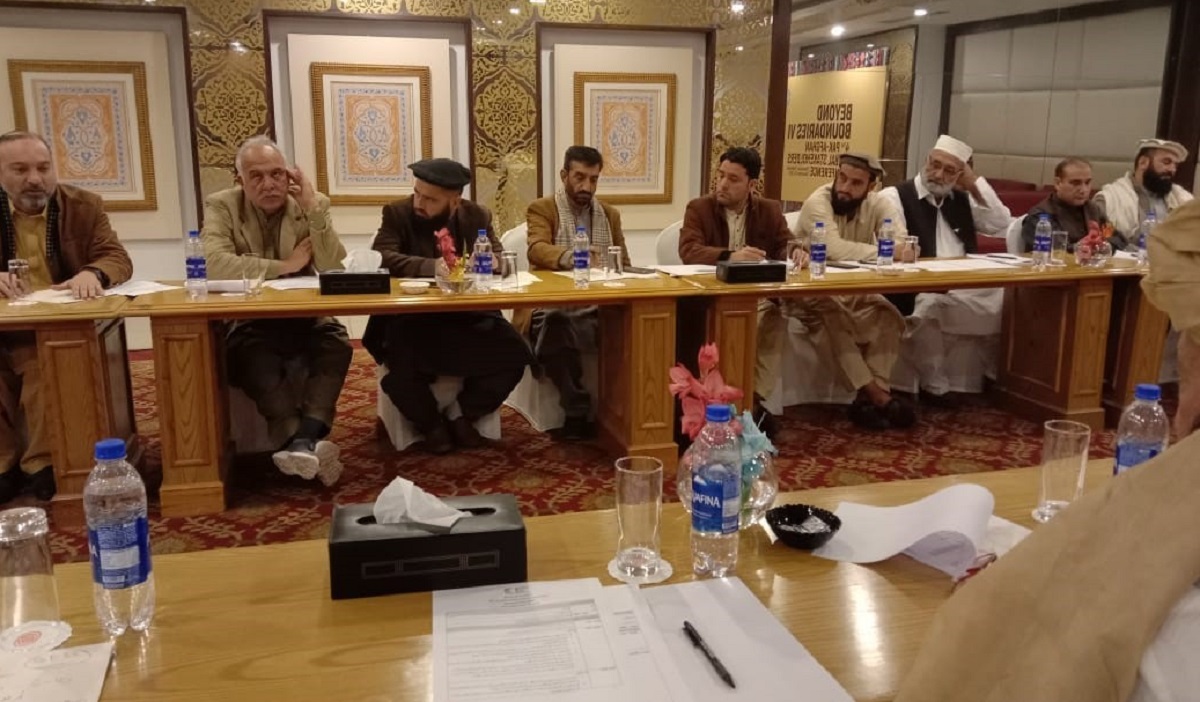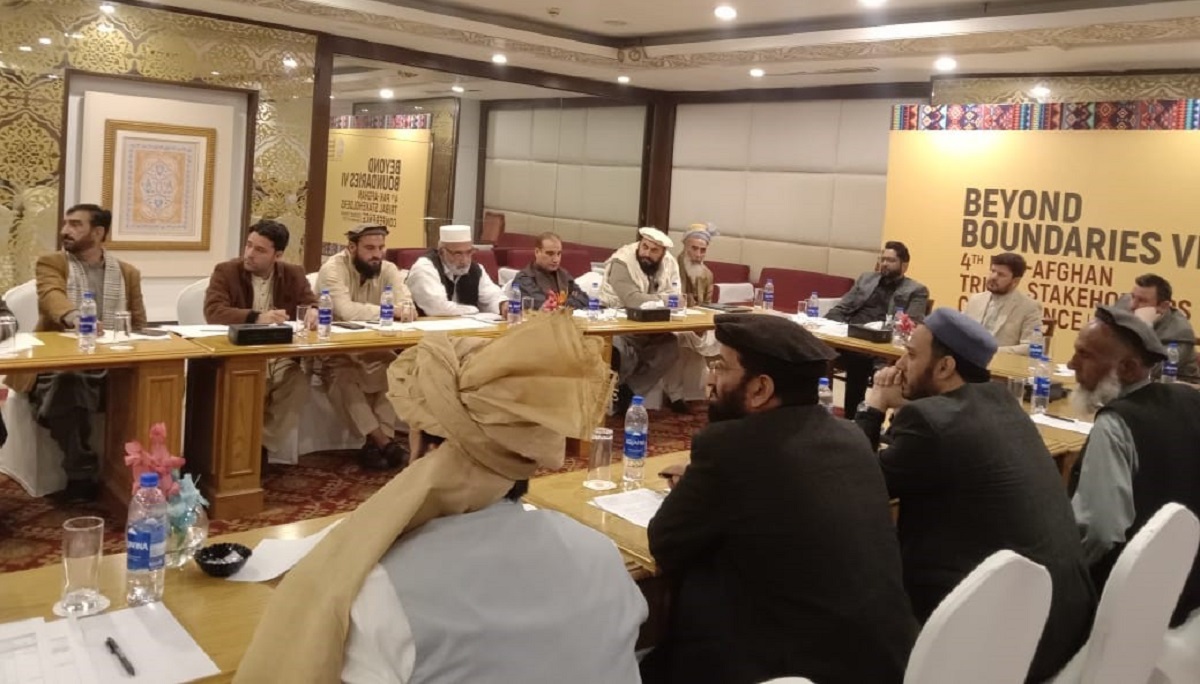The 4th Pak-Afghan tribal stakeholders’ conference was organized by the Center for Research and Security Studies (CRSS), in collaboration with its Afghan partner, the Organization for Economic Studies and Peace (OESP). Around 20 tribal representatives from both countries offered workable solutions for bilateral challenges pertaining to security, stability, economic growth, the present refugee crisis, and the humanitarian and human rights conditions existing in Afghanistan.
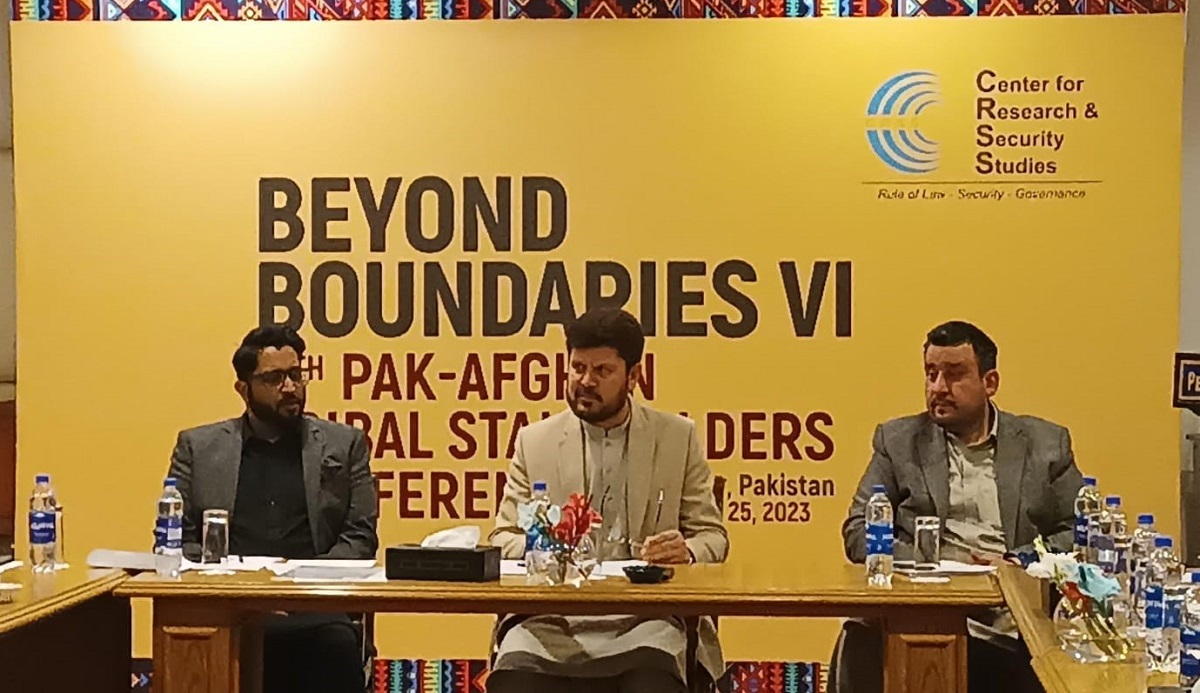
CRITICAL ANALYSIS
The conference convened key stakeholders from Pakistan and Afghanistan to collaboratively address challenges faced by communities along the Torkham border. The agenda was formulated based on a Qualitative Study of Pak-Afghan Border Communities conducted by CRSS, serving as a feeder mechanism..
The analysis of the deliberations revealed that the predominant focus was on concerns related to Pak-Afghan trade, as it directly influenced their livelihoods. Consequently, each facet of the discussion related to peace, security, and refugee affairs was discussed and scrutinized within the context of trade and connectivity.
Regarding the repatriation of Afghan refugees, tribal leaders advocated for a dignified and graceful process, emphasizing respecting the refugees’ dignity. They further accentuated the necessity for international aid to support the deportation of undocumented Afghans. Discussion points included existing security challenges, particularly the volatile situation in Afghanistan, with tribal leaders expressing unwavering support for both governments in their efforts to ensure peace and stability in the bordering areas. Additionally, the socio-economic reintegration of the refugees, including access to education, healthcare, and employment, was deliberated upon due to the significant challenges it poses to their return.
The crux of the discussion is that the situation requires a coordinated effort among the governments of Pakistan and Afghanistan, with the assistance of tribal leaders, to address these complex issues and ensure a smooth and sustainable environment between the two countries.
RECOMMENDATIONS
The participants proposed the following set of concrete recommendations in light of recent challenges impacting bilateral ties:
TRADE AND ECONOMY
- Participants urged both governments to invest in improving cross-border infrastructure, such as roads and border crossings, to facilitate cross-border trade and transportation means.
- The Pakistani government should simplify customs procedures at the border and reduce bureaucratic hurdles to expedite a smooth flow of trade. A special permit to be issued for border communities was also suggested by the participants, including introducing new technologies to improve logistics, payments, and communication, for a more efficient and transparent cross-border trade system.
- Reduction in tariffs and trade barriers to encourage increased trade between the two countries.
- Ease restrictions on the issuance of visas such as an E-Visa service or on-arrival visa.
- Strict measures to be implemented, including the illegal smuggling of U.S. dollars, controlling human trafficking, and ensuring a continuous supply of wheat, and sugar from Afghanistan to Pakistan.
- Organize joint trade exhibitions, business forums, and promotional events to connect businesses from both countries and foster collaboration.
- Consider new business alternatives for border communities like farming, and fisheries.
PEACE AND SECURITY
- Tribal leaders on both sides should extend their support to their respective governments in ensuring peace and security in their bordering areas. And in particular, the IEA should address cross-border attacks by Tehrik-i-Taliban Pakistan (TTP) into Pakistan with firm resolve.
- To hold regular jirgas in Islamabad and Kabul for better understanding and cooperation.
GIRLS’ EDUCATION AND WOMEN’S RIGHTS
- The Islamic countries, religious scholars, and the international community should engage with the Taliban diplomatically and advocate for removing the Taliban’s ban on girls’ education.
- The Afghan government, with the support of international donors should invest in better educational facilities and infrastructure, enhance security measures, and promote community engagement to support education for girls in the area.
REFUGEE ISSUES
- The international community to extend aid and facilitation for the dignified return of Afghan refugees. The Pakistani government should have a more flexible policy for undocumented Afghan refugees, enabling them to conclude their affairs in Pakistan, prior to deportation.
- The IEA should establish relief camps for Afghan refugees returning from Pakistan and provide crucial support in terms of shelter, food, and necessities.
GOVERNANCE, LAW AND ORDER
- The forum recommended that both sides should conduct regular internal and external checks to monitor adherence to customs regulations, and drug smuggling, to implement corrective measures promptly.
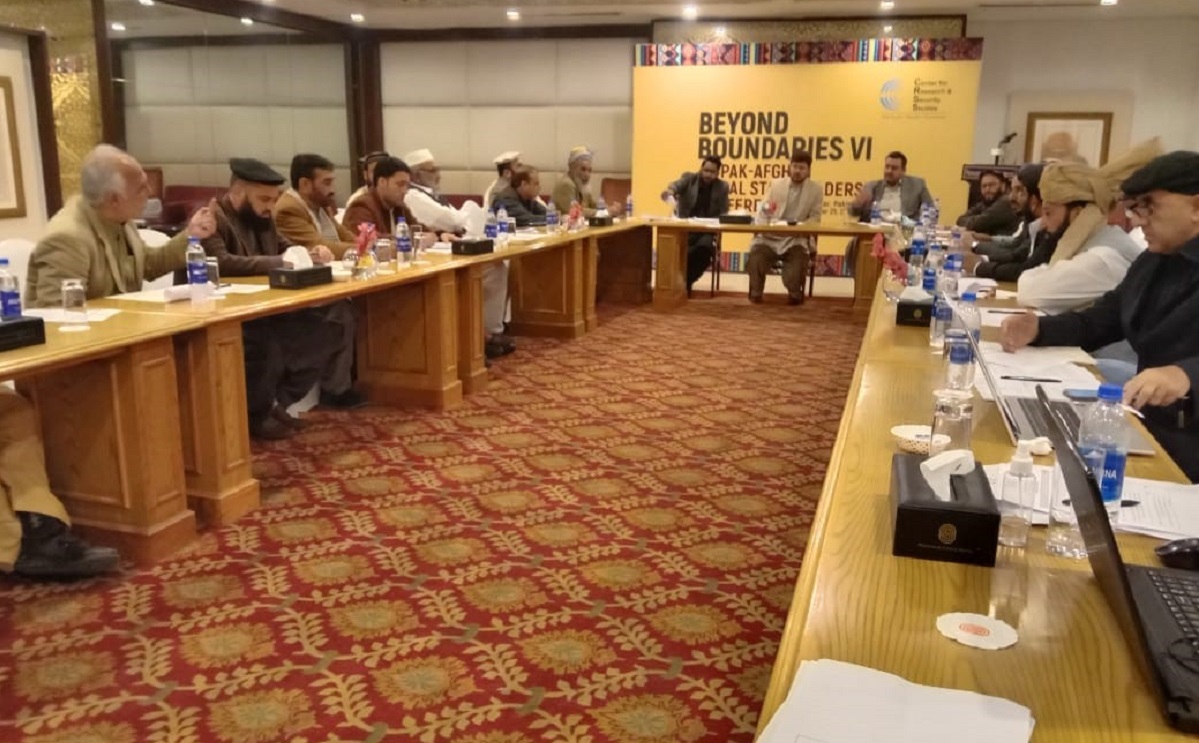
SUMMARY OF THE DISCUSSION
TRADE AND ECONOMY
An Afghan trader emphasized that trade and economic development between Pakistan and Afghanistan is crucial for several reasons. “Robust economic ties promote regional stability by fostering mutual interdependence, reducing the likelihood of conflict, and enhancing economic cooperation, all of which contribute to peace-building efforts in the region. This economic development, in turn, can lead to poverty reduction and an improved standard of living for the people of Pakistan and Afghanistan,” he added.
Mr. Malak Masal Khan Shinwari stated that local communities solely depend on cross-border trade for their livelihoods. Any disruptions or trade-related issues at Torkham can significantly affect the economic stability of these communities. To improve bilateral trade, he continued, both sides should offer trade promotion initiatives and other means of revenue.
Participants from both sides highlighted the key challenges faced by them and their implications on the daily life of the common man. Both parties involved warned those in charge against sudden border closures and, the risk of significant financial losses, especially for traders who deal in perishable goods like fruits and vegetables.
The implementation of streamlined customs procedures and the reduction of trade barriers were also highlighted, along with the initiation of bilateral trade agreements for mutual economic benefit.
PEACE AND SECURITY
Both sides affirmed their commitment to promoting peace and building mutual trust. The elders stressed the importance of maintaining open communication channels to effectively address common challenges. Border security took center stage, with participants demanding the strict implementation of security measures and increased collaboration in counter-terrorism activities.
Maulana Khanzeb expressed concern about the intricate security situation in both Afghanistan and Pakistan, as multiple factors are contributing to the instability in the region such as the existence of militant groups. “We request that the Afghan government take direct, decisive action against the TTP Militants,” he added.
Nonetheless, tribal leaders extended their support to both governments in ensuring peace and security in their bordering areas.
EVICTION OF UNDOCUMENTED AFGHAN MIGRANTS
Mr. Mirza Muhammad expressed grave concerns, saying, “The Pakistani government needs to be more understanding and accommodating and give undocumented Afghan refugees additional time to finalize their affairs before they depart and head back home. These families have lived here for decades and see Pakistan as their home.”
Most importantly for Afghan families whose children, particularly girls, are enrolled in Pakistani schools and colleges to finish their education, as the Taliban has banned females from pursuing higher education in Afghanistan, he added.
GIRLS’ EDUCATION AND WOMEN’S RIGHTS
All participants, including religious leaders, voiced concern about the Taliban’s ban on girls’ education and encouraged the government to reopen education centers for women.
One of the participants stated how this move is seen as a significant setback for the rights of women and girls in the country. “Denying opportunities for girls to develop skills and contribute to society perpetuates a cycle of inequality, limiting the potential for social and economic development in the region.”
Mr. Malak Saif Rahman Afridi voiced disappointment with the lack of attention given to the education sector near the tribal belt and felt that both governments should make significant investments in high-quality educational establishments, given that the majority of schools lack adequate staff and resources.
GOVERNANCE, AND LAW AND ORDER
The issue of weak governance due to smuggling across the border was raised by the Pakistani delegation.
Mr. Muhammad Mustafa called for strict measures to control smuggling, including the illegal trafficking of U.S. dollars, human trafficking, and continuous supply of wheat, and sugar from Afghanistan to Pakistan.
Another point of concern brought up by the participants was bribery by high-ranking officials at the Torkham Border and how it taints legal procedures, undermines effective management, and compromises law enforcement’s integrity.
CONCLUSION AND WAY FORWARD
To sum up, the participants from both countries reaffirmed their commitment to fostering peace and security through the following recommendations. To enhance trade ties, ensure the dignified return of Afghan nationals from Pakistan, and most importantly, empower girls’ education for long-term prosperity and stability in the region. Moving forward, sustained dialogue and cooperation is crucial for achieving these goals and promoting a harmonious relationship between the two nations.
Collaborative efforts can lead to mutually beneficial outcomes and improve relations between the two nations and solutions to long-standing issues between both countries.
The meeting concluded with a joint commitment to continued dialogue and cooperation, acknowledging the complexities of regional dynamics, and expressing optimism about working together to overcome challenges.
